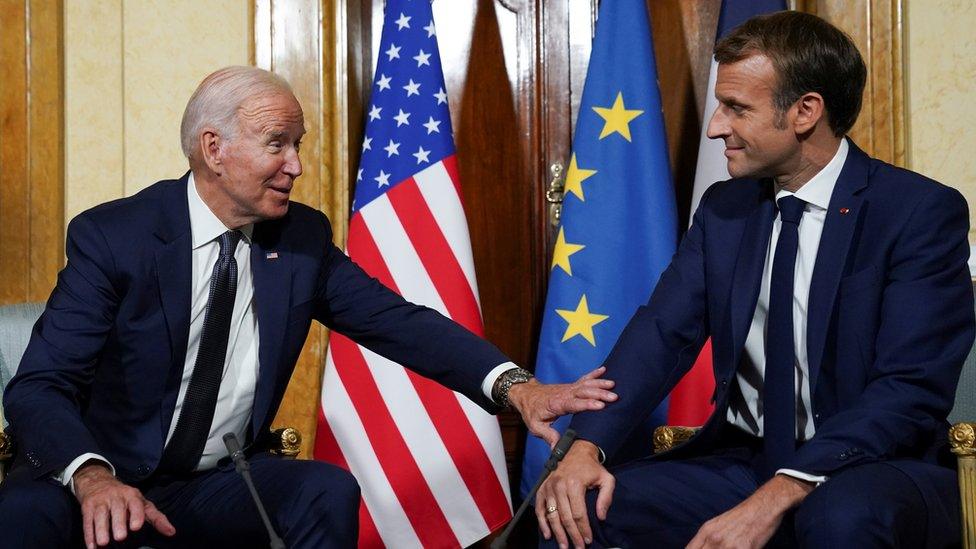France's Emmanuel Macron joins the Bidens for a White House state dinner
- Published
Watch: What issues are on the menu for US and France?
Cheese is serious business for the French; their citizenship tests even include fromage-related questions.
But French President Emmanuel Macron and his entourage will be served American-made cheese at the White House on Thursday, which is on the menu curated by First Lady Jill Biden.
The Bidens are hosting their first state dinner, a grand affair in Washington for visiting heads of state.
It's a delicate display of soft power some six months in the making.
From the guest list to the menu to the seating plan, every detail of these dinners calls for the meticulous attention of the first lady, the State Department, and a brigade of White House aides and chefs.
Scores of world leaders visit Washington every year but only a few ever get a state dinner, at the discretion of the US president and on the recommendation of his foreign policy advisors.
A diplomatic charm offensive, the first ever state dinner was held in 1874 when US President Ulysses Grant welcomed King David Kalakua of the Kingdom of Hawaii to the White House, and the tradition has continued under most presidents since then.
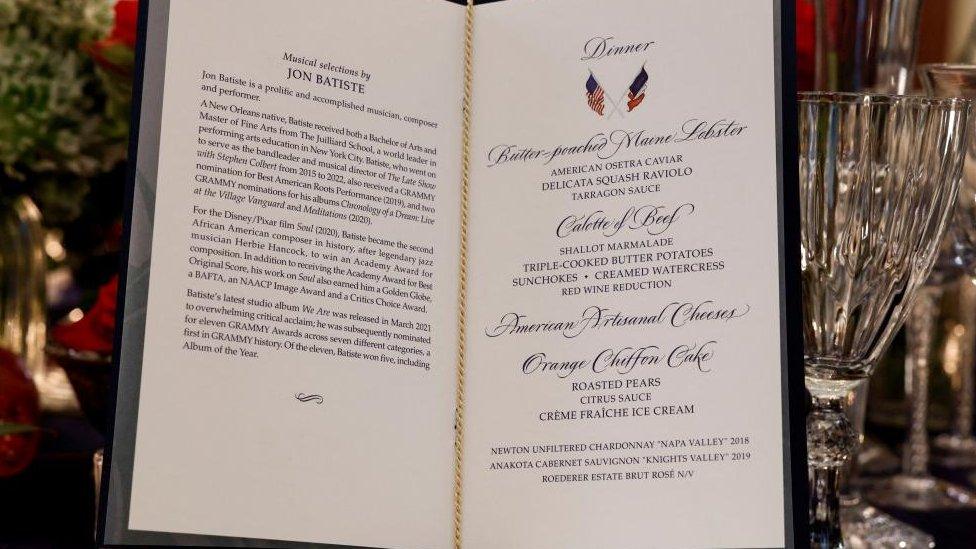
The evening's meal and entertainment, from the music to the wine
Thursday's event will see 300 to 400 guests join President Joe Biden, President Macron and their wives inside a large heated tent on the complex's South Lawn, and will feature a live musical performance from Jon Batiste, the former musical director of The Late Show with Stephen Colbert.
Guests will dine on a menu that includes caviar, sparkling wine, 200 live lobsters and - most notably - a cheese course highlighted by blue cheese from Oregon.
The Rogue River Blue Cheese was the first American product to ever win the World Cheese Awards, back in 2019 - making its appearance at the dinner "a touch of American soft power", as one French news outlet put it, external.
"We hope that the French citizens everywhere feel the warmth of our welcome," Mrs Biden said on Wednesday. "May our friendship grow stronger, our ties deeper and our futures brighter as we deepen our partnership."
This dinner comes nearly two years into Joe Biden's presidency. It is one of the longer waits for a president to host his first state dinner, a reflection of the Covid-19 pandemic's outsized impact on the 80-year-old's time in office.
It also marks a second US state dinner for Mr Macron, 44. He was the first recipient of a state dinner hosted by President Donald Trump, in 2018.
The US often refers to France as its oldest ally and, when asked on Thursday why the French leader was picked as his first guest, Mr Biden said: "Because he is my friend."
But the truth is a lot more complicated. While the two leaders appear to have a warm personal relationship, they have lately had to smooth over a couple of major policy differences.
Last year, Mr Macron was incensed by a joint defence pact between the US, UK and Australia that cost France a submarine contract worth billions of dollars.
The French president recalled his ambassador in Washington and his foreign minister called the move "a stab in the back", forcing Mr Biden to publicly acknowledge the deal's rollout had been "clumsy".
On Wednesday, the first day of Mr Macron's visit, he sharply criticised his US counterpart's recently-passed legislation - the Inflation Reduction Act (IRA) .
Climate subsidies offered under the IRA give American companies an advantage over European ones that would be "super aggressive for our business people", Mr Macron is reported to have said during a meeting with US lawmakers.
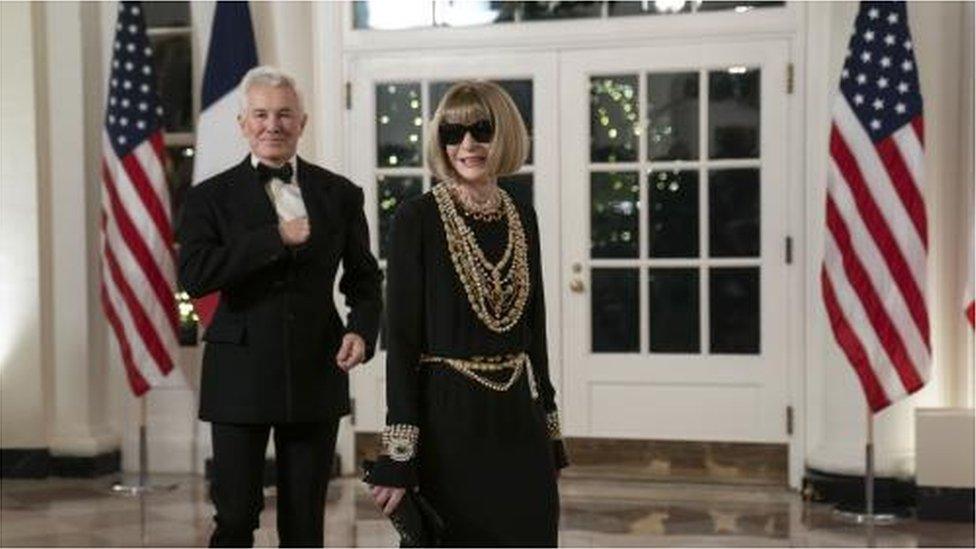
Dinner guests included Anna Wintour, editor in chief at Vogue and director Baz Luhrmann

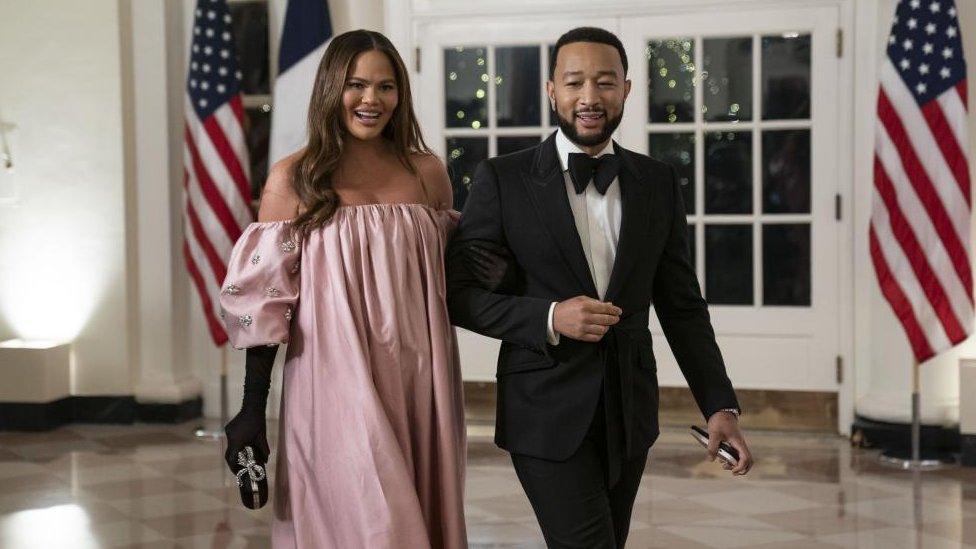
US singer John Legend and US model Chrissy Teigen were also guests

The French just want "to be respected as a good friend", he added.
The White House has responded that it does not see the growth of the global clean energy sector as "a zero-sum game" and will seek "a constructive path of engagement with the EU [European Union]".
In a joint news conference on Thursday, Mr Biden said the two countries had found common cause on major issues, including the war in Ukraine.
On the IRA he said: "We had a detailed discussion."
"We want to succeed together, not one against the other," Mr Macron added.
Ahead of the dinner, Mr Biden will also face a point of contention closer to home - he is in a bit of hot water over the butter-poached Maine lobsters he is serving.
"The lobster on the White House menu comes from a fishery with well-documented risks to the remaining 340 critically endangered North Atlantic right whales that are often entangled in fishing gear," Gib Brogan, a campaign manager at conservation advocacy group Oceana, said on Wednesday.
"Smarter choices would include a menu with wild Gulf shrimp or Atlantic scallops from US fisheries that have tackled endangered species problems head-on and developed effective ways to minimize risk."
The choice of lobsters also riled several Maine elected officials, who criticised the White House for serving the dish while the lobster industry is facing new federal regulations related to whale conservation.
Governor Janet Mills tweeted that she urged the Biden administration "to recognise that all Maine lobstermen want is the opportunity to continue providing this product for people to enjoy without the federal government crushing them under the weight of burdensome, scientifically-questionable regulations".
Related topics
- Published3 September 2021
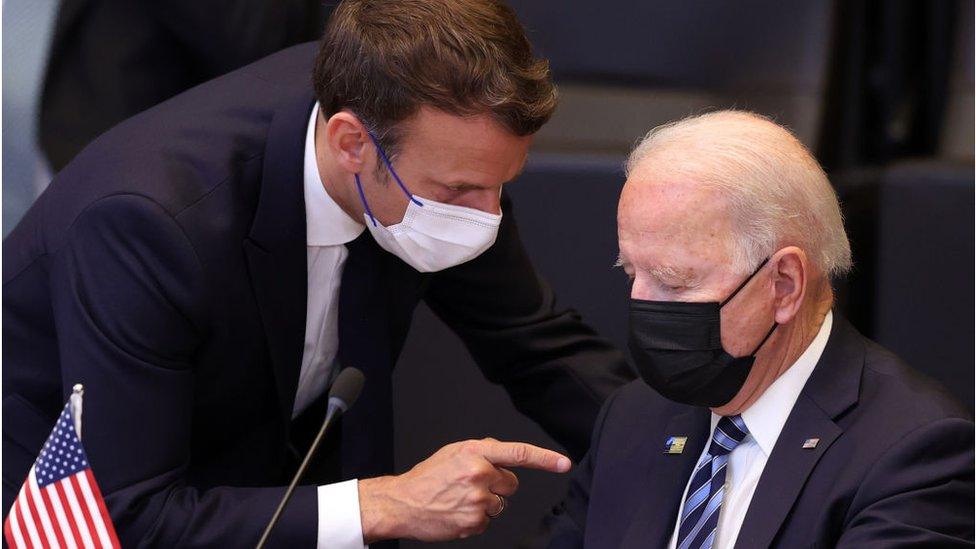
- Published29 October 2021
